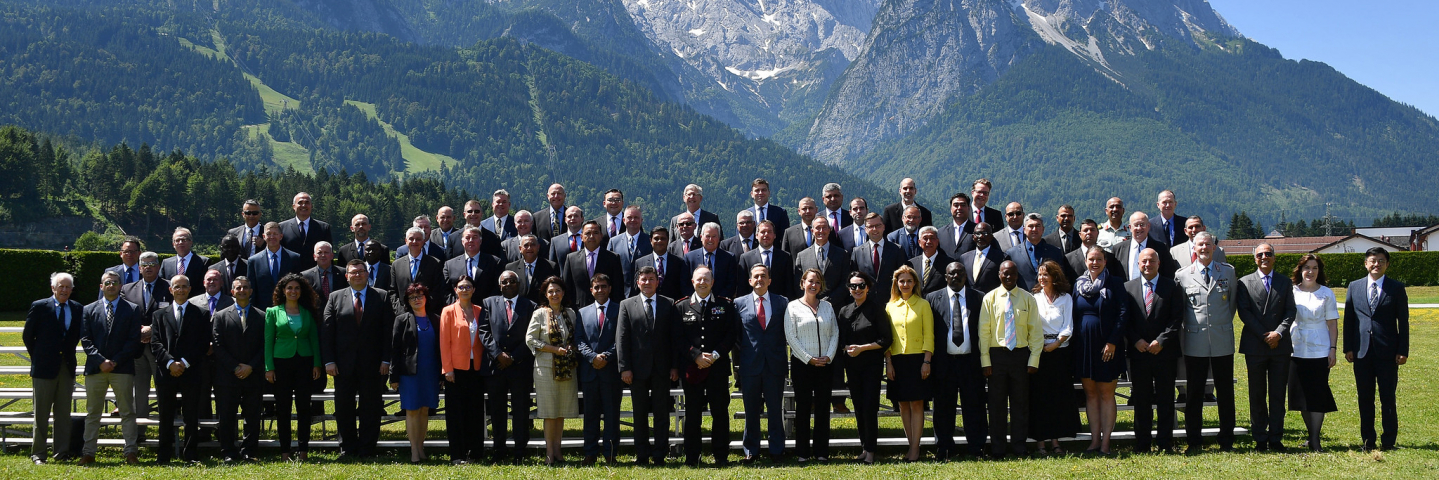
Marshall Center’s Senior Executive Seminar Aims to Understand Chinese Engagement in Europe
By Emma Bareihs
Public Affairs Office
George C. Marshall European Center for Security Studies
GARMISCH-PARTENKIRCHEN, Germany (June 28, 2019) – The George C. Marshall European Center for Security Studies hosted the annual Senior Executive Seminar, titled “China in Europe: A Security Challenge?,” here June 24 to 28.
This iteration of SES focused on understanding Chinese policy, strategic communication and economic goals in Europe, with respect to trade, investment and infrastructure.
The theme was chosen as states and institutions in Europe, and elsewhere, are trying to understand and adapt to the changing nature of China’s presence in European affairs, said Italian Carabinieri Brig. Gen. Sebastiano Comitini, Marshall Center’s SES course director.
“Europe and the United States should very much talk about how they see China as an emerging challenge in their own policy,” said Dr. Pál Dunay, academic advisor to SES 19-14.
We expect to give participants a full overview of how different countries and major players see China’s issue. How much is it a security issue? How much is it only an economic challenge? How much is it an opportunity?,” said Dunay.
This year’s seminar consisted of 65 participants from 36 countries. Participants included senior government officials such as ambassadors, deputy ministers, major state agency advisors, and scholars and journalists working at the senior professional level.
During his opening remarks, Marshall Center Director retired U.S. Army Lt. Gen. Keith Dayton identified China in Europe as a contemporary security challenge that needs to be closely examined and discussed.
“It is a very timely topic, and one that affects all of us in this room, whether we are from Europe, Africa, the Americas or Asia,” Dayton said.
On the second day, Dr. Aaron Friedberg spoke on the topic of the United States’ views on China. Friedberg is a professor of politics and international affairs at Princeton University, co-director of the Woodrow Wilson School’s Center for International Security Studies and Senior Advisor to the National Bureau of Asian Research.
“Europe is now a major focus of Chinese economic and diplomatic activity,” Friedberg said. “In my remarks, I put the developments of the last several years in a somewhat broader historical perspective, as well as provided an overview of the current debate over U.S.-China policy.”
Later in the day, Dr. May-Britt Stumbaum, director of the director of the NFG Research Group Asian Perceptions of the European Union at the Free University of Berlin, shared her view of Chinese strategic communication in Europe.
People will get an idea about why Chinese strategic communication is constructive, in the way that China actively tries to shape an image, said Stumbaum.
“While every country practices public diplomacy, there is a boundary between legal and illegal means,” Stumbaum said. “I hope participants get inspired to think about this and to become more aware about how they get influenced and to what extent, to which they might be manipulated.”
Other speakers during the week included Matthew Turpin, from the National Security Council, Charles Horner, senior fellow of The Hudson Institute, Dr. Eberhard Sandschneider, Department of Chinese and East Asian Politics chair at the Free University of Berlin, George Cunningham, special advisor to the Asia Department of the European Union, and Dr. Xin Zhang, associate professor at the East China Normal University.
In addition, Marshall Center Professor Dr. Valbona Zeneli, chairman of the Board of International Security Studies Institute Africa, Dr. Jakkie Cilliers, professor at the Graduate Institute of International and Development Studies in Geneva, Lanxin Xiang and Dr. Sungmin Cho, from the Daniel K. Inouye Asia-Pacific Center for Security Studies, presented at SES.
Further presentations at SES 19-14 ranged from China’s increasing footprint in Africa to understanding the 16+1 initiative, a Chinese initiative towards economic cooperation in Europe.
Theresa Fallon, director of the Centre for Russia Europe Asia Studies in Brussels and who presented on the topic of China’s Belt and Road Initiative in Europe, said she finds the SES exchange of views “invaluable.”
“My experience from being here with people from so many backgrounds has been very valuable to hear how people from other countries perceive this new geopolitical landscape,” Fallon said.
Through seminar discussion, strategic leaders had the opportunity to examine Chinese goals in and around Europe, as well as the ways and means it uses to reach them.
“I think it’s important to discuss Chinese influence without judging if it’s good or bad, but by giving people the information, so they can judge for themselves,” Stumbaum concluded.